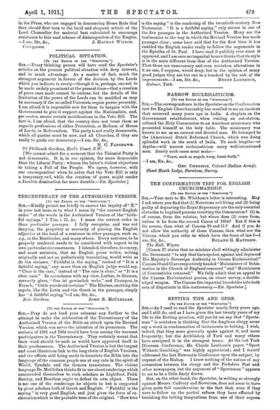[To THE EDITOR OP THE "SPECTATOR."] Sin,—Pray do not lend
your columns any further to the attempt to make the celebration of the Tercentenary of the Authorised Version of the Bible an attack upon the Revised Version, which was never the intention of its promoters. The revisers of 1881 and 1884 would have been among the warmest participators in the Tercentenary. They certainly meant that their work should be such as would have approved itself to their predecessors. The Authorised Version is but the longest and most illustrious link in the long chain of English Versions, and the efforts still being made to translate the Bible into the language of the common people are at any rate in the spirit of Wiclif, Tyndale, and the Geneva translators. The violent language Dr. McClellan thinks fit to use about renderings which commended themselves to such scholars as Lightfoot, Field, Sanday, and Headlam ought to defeat its own object. There is no; one of the renderings he objects to but is supported by great scholars both of Greek and English. " Faithful is the saying " is very good English, and just gives the form of ex- elamationwhich is the probable tone of the original. "How true is the saying" is the rendering of the twentieth-century New Testament. " It is a faithful saying " only occurs in one of the five passages in the Authorised Version. Many are the testimonies to the way in which the Revised Version has made passages clear ; some have said that for the first time it has enabled the English reader really to follow the arguments in the Epistles of St. PauL I have read it publicly ever since it appeared, and I am sure no impartial hearer thinks that its style is in the main different from that of the Authorised Version. That there are unnecessary and even mistaken alterations in it no one, I suppose, would deny, but in the opinion of many good judges they are but one in a hundred by the side of the improvements.—I am, Sir, &c., HENRY LAURENCE, _Hubner, York.










































 Previous page
Previous page